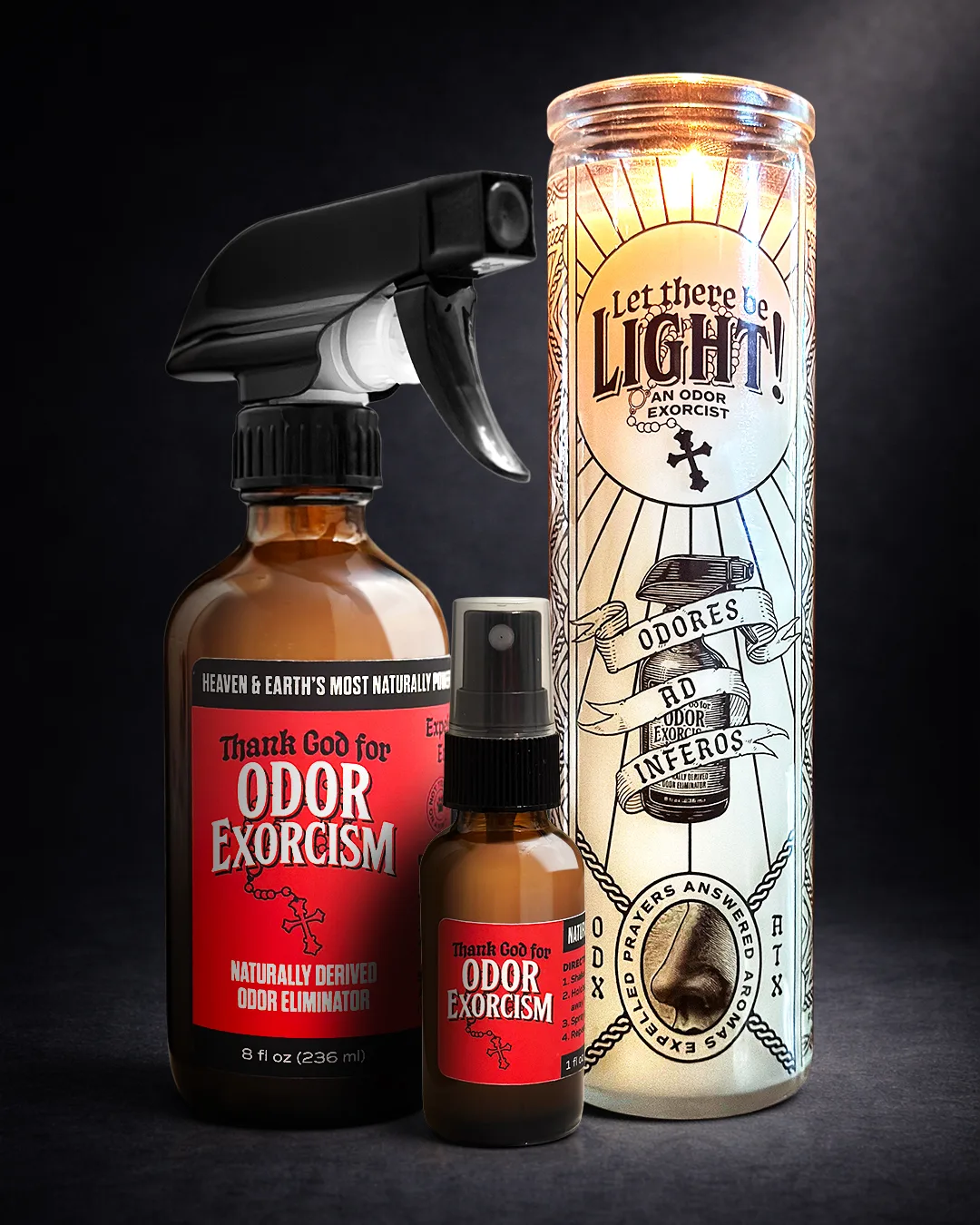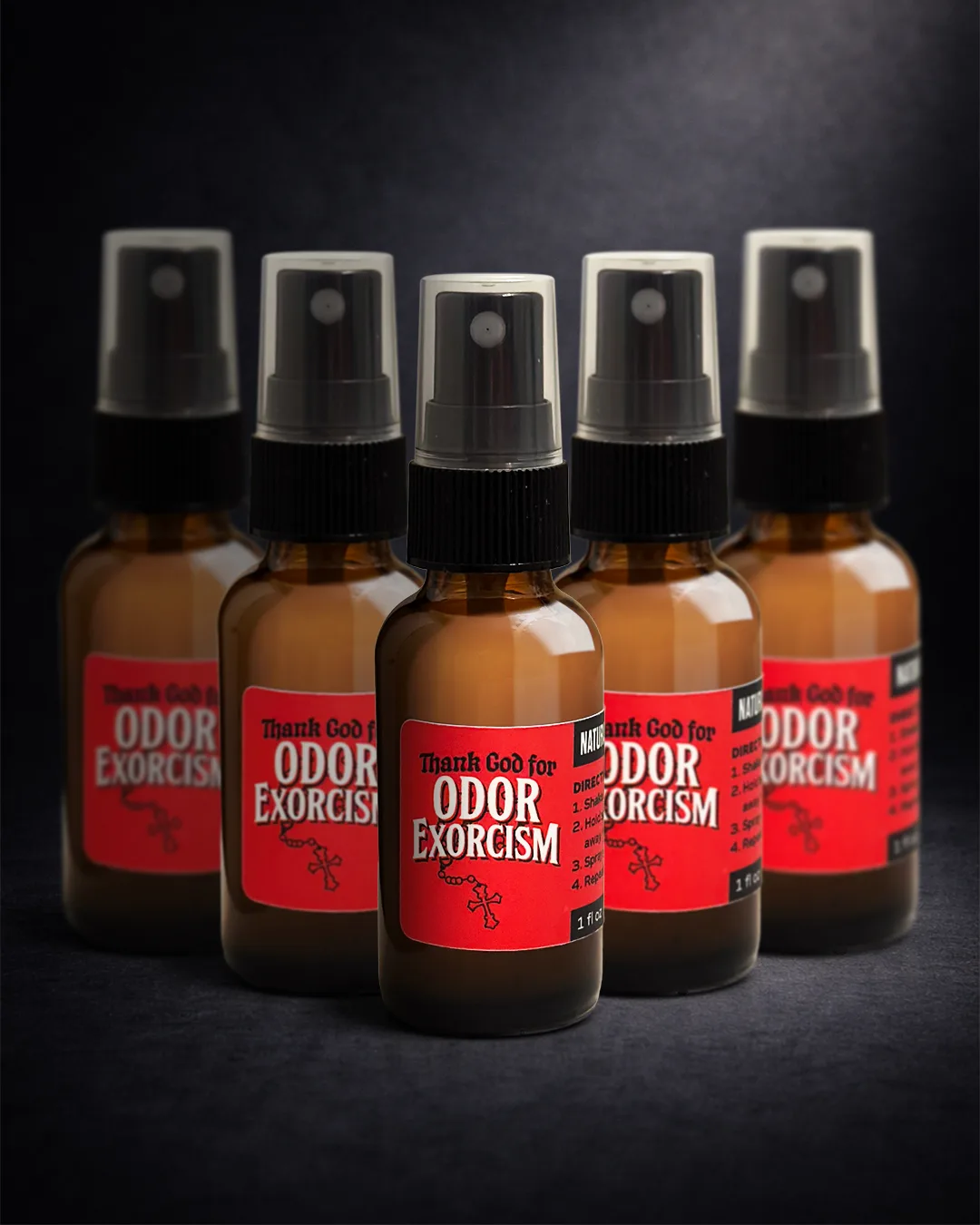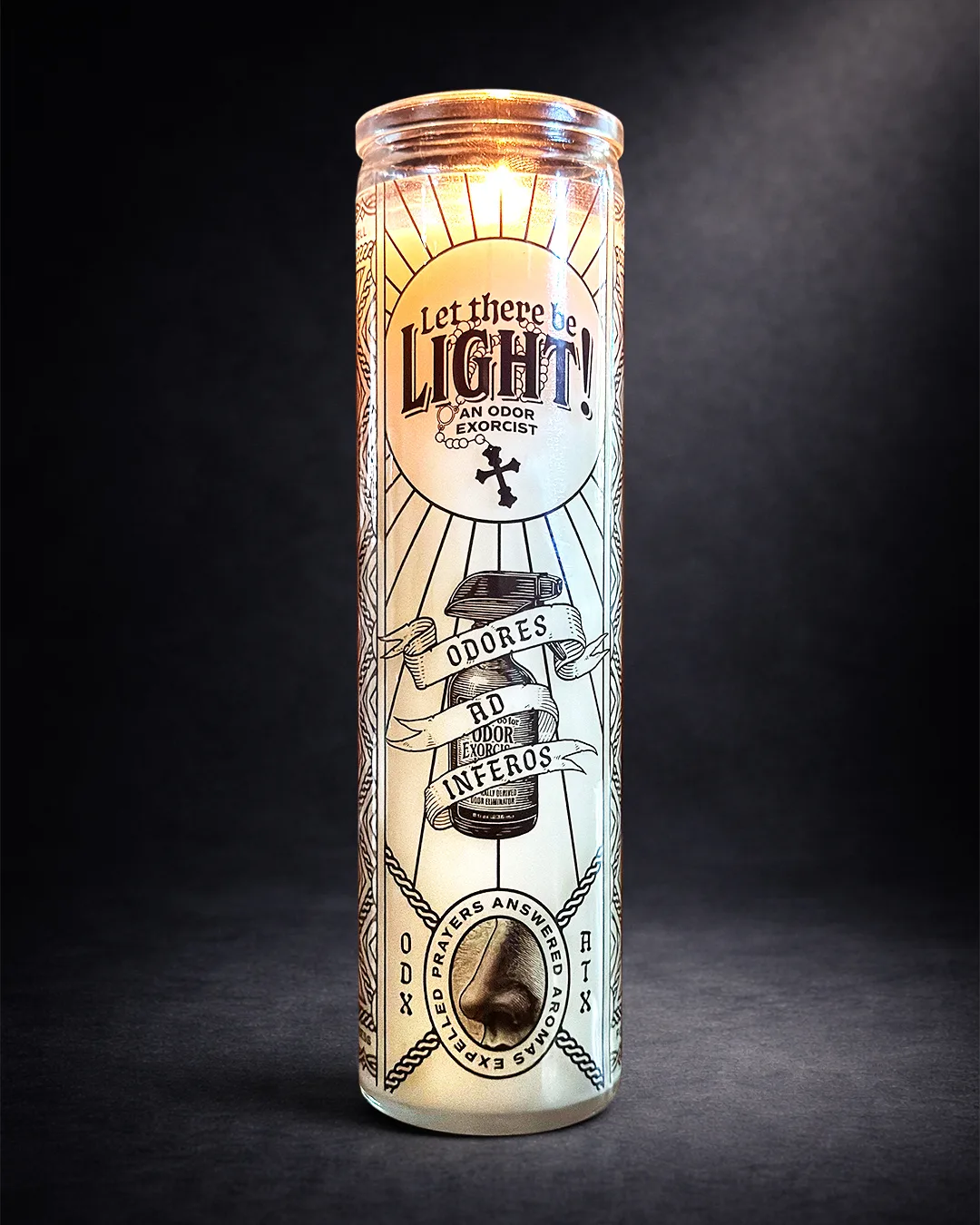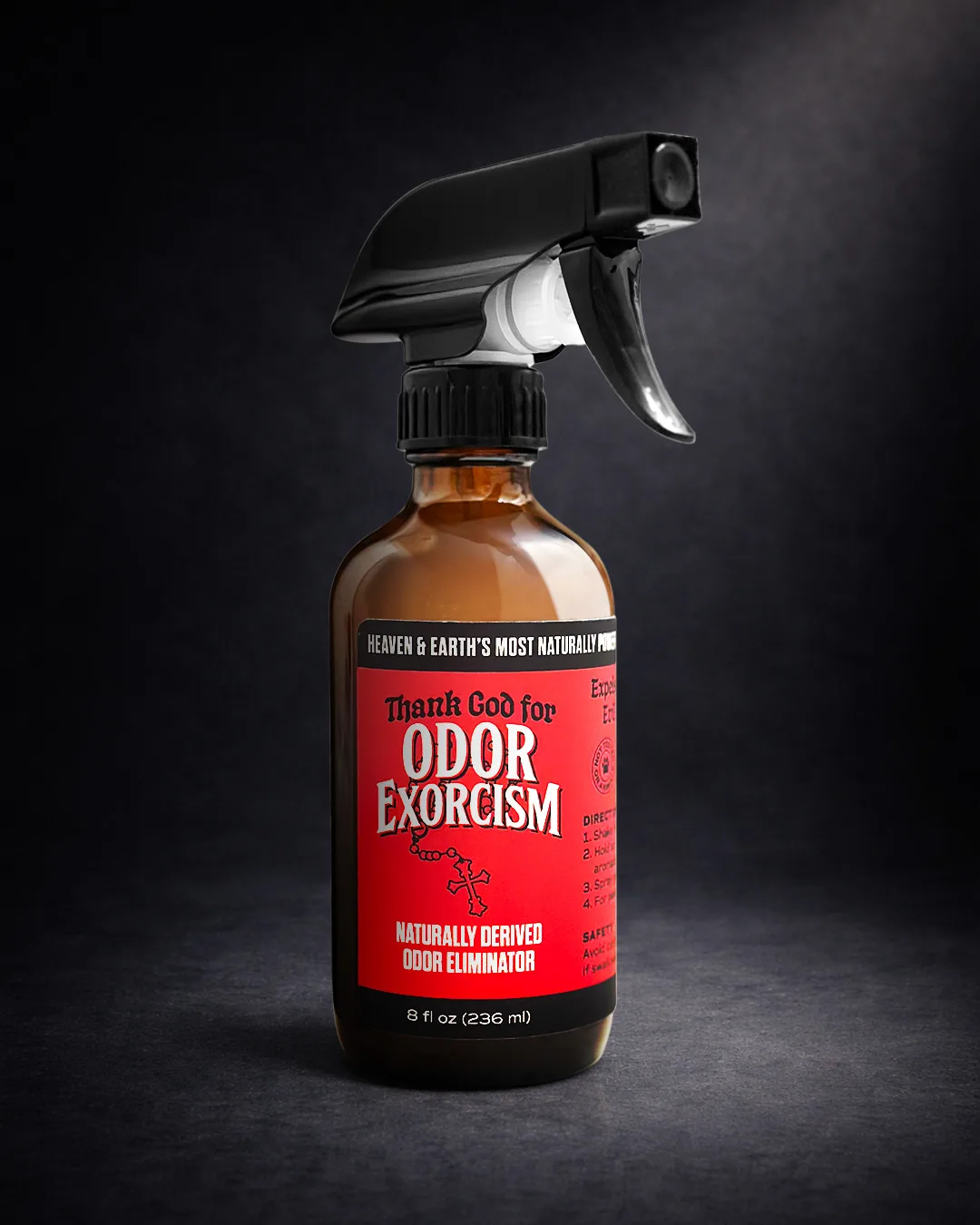The malevolence of fragrance in cleaning products (and safer natural alternatives)
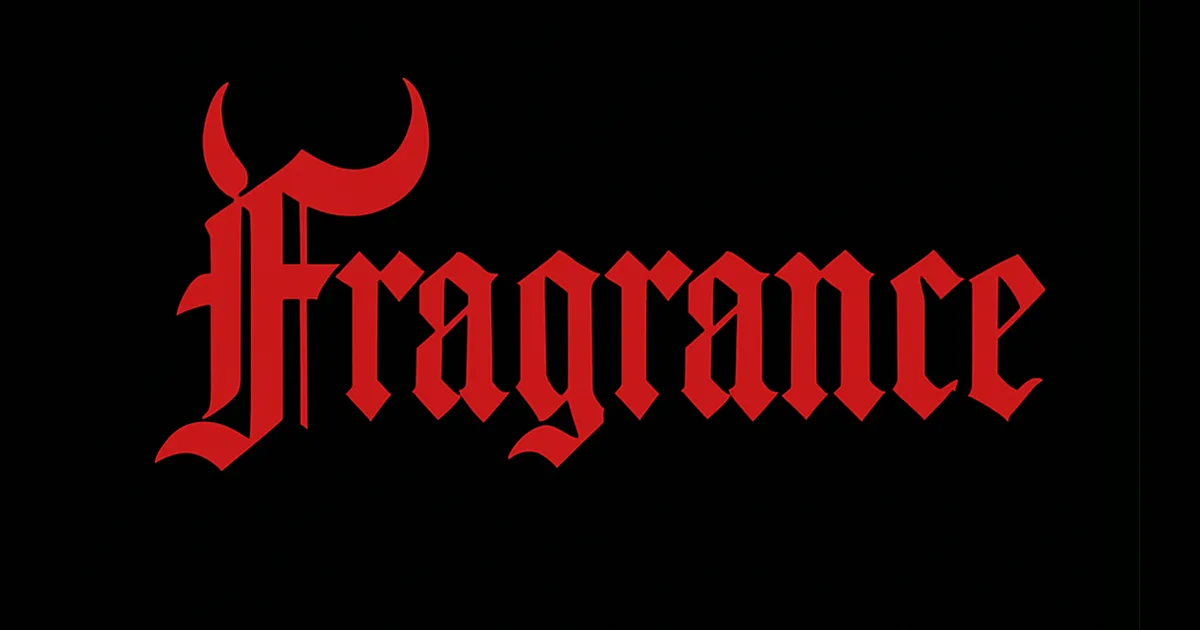
October 5, 2025
When you grab a bottle of laundry detergent, all-purpose cleaner, or, yes odor eliminator spray, the word “fragrance” often appears on the label. It might sound harmless or even appealing—who doesn’t want fresh-smelling (fragrant) clothes or a sparkling lemon-scented kitchen? But don’t be fooled by its innocuous sounding name, for fragrance is in fact the devil, or at the very least, a spawn of Satan.
Why? Well, like the devil, fragrance is deceptive: it’s actually a catch-all for thousands of undisclosed chemicals, many of which carry health and environmental risks.
This article explores what “fragrance” really means, why it’s a concern in home cleaning products, and why natural alternatives like essential oils—three of which can be found in every bottle of Odor Exorcism—may be safer and more sustainable.
What does “fragrance” really mean?
Under U.S. regulations, fragrance formulations are considered trade secrets, which allows companies to group them under a single label without disclosing ingredients. The International Fragrance Association (IFRA) maintains a list of over 3,500 approved fragrance chemicals, including:
- Synthetic musks (long-lasting scents)
- Phthalates (a petrochemical, used as fixatives)
- Solvents and preservatives
- Allergens and sensitizers
This lack of transparency means consumers are often unaware of the true chemical makeup of the products they use daily. Like so many other things, the devil is in the details.
Hidden chemicals often found in fragrance
Here are some common hazardous chemicals that may be hiding behind the word “fragrance”:
1. Phthalates
- Used to make scents last longer
- Linked to endocrine disruption, reproductive harm, and thyroid issues
2. Synthetic musks (Galaxolide, Tonalide)
- Persistent in the environment and accumulate in human tissue
- Potential hormone disruptors
3. Formaldehyde-releasing agents
- Used as preservatives in fragrance blends
- Formaldehyde is a known carcinogen and respiratory irritant
4. Volatile organic compounds (VOCs)
- Contribute to indoor air pollution
- Can cause headaches, nausea, and long-term lung damage
5. Allergenic compounds (Limonene, Linalool, Citronellol)
- Natural in origin, but when synthetically produced or oxidized, may trigger eczema, asthma, or skin reactions
Where does fragrance come from?
Based on available information, it is the belief of Odor Exorcism that most fragrance chemicals (at least the petrochemical ones) come from an oil well in hell.
Health risks of synthetic fragrances
Because fragrance chemicals can enter the body through inhalation (like after a good spritz of odor eliminator), skin absorption, or residues on fabrics and dishes, exposure can have wide-ranging effects, all of which are closely analogous to demonic possession:
- Respiratory issues (asthma attacks, chronic bronchitis)
- Hormonal disruption (linked to fertility and metabolic problems)
- Neurological symptoms (headaches, dizziness, difficulty concentrating)
- Skin irritation (allergic contact dermatitis and rashes)
Children, pregnant women, and people with chronic health conditions are particularly vulnerable.
Environmental hazards
When you let fragrance chemicals (AKA Beelzebub) into your home, they don’t just stay there. They’re washed into waterways during cleaning and laundry, where they can persist in ecosystems. Compounds like synthetic musks bioaccumulate in fish and wildlife, contributing to long-term pollution that threatens biodiversity. If you hate God’s greatest gift to humanity—Earth—then by all means, keep using fragrance chemicals in your home cleaning products.
Why essential oils may be a safer alternative
High-quality essential oils—like the aromatherapy-grade ones found in Odor Exorcism—provide a more transparent and often safer option for scenting cleaning products. These plant-derived oils are distilled or cold-pressed, and when properly diluted, they can be both pleasant and functional.
Benefits of essential oils:
- Clear labeling: Single-ingredient plant extracts with no hidden blends
- Added benefits: Some oils (like lavender, frankincense, and orange) have antimicrobial or antifungal properties; these help with disinfection, and yes, odor elimination
- Eco-friendly: Naturally biodegradable, unlike synthetic musks
- Fewer toxic risks: When diluted properly, essential oils are generally less harmful than synthetic fragrance chemicals
Safety notes:
- Always dilute essential oils before use to avoid skin irritation (Odor Exorcism is not meant to be used on skin, and the essential oils contain therein are massively diluted with pure distilled water, which serves as the product’s solvent base)
- Some oils are unsafe for pets and small children (e.g., tea tree oil for cats and dogs)
- Quality varies—choose oils labeled 100% pure, therapeutic grade, and third-party tested
How to avoid hidden fragrance chemicals
Here are practical steps to reduce your exposure:
- Read labels carefully – Avoid products that simply list “fragrance” or “parfum”
- Choose fragrance-free – Look for “fragrance-free” rather than “unscented,” which may still contain masking agents
- Ventilate your space – Open windows or use fans to reduce indoor VOC buildup
- Support transparent brands – Choose companies that publish full ingredient lists, like Odor Exorcism
Odor eliminators that contain fragrance chemicals
We hate to name shame, but the evil formulas of some of our competitors absolutely demand it. Without further ado, here are some common and popular odor eliminators that contain “fragrance”:
- Febreze
- Mrs. Meyer’s
- Caldrea
- Lysol Air Sanitizer Spray
- Glade Automatic Spray
And more.
Conclusion
The word “fragrance” may sound harmless, but in reality it hides a complex mix of chemicals, many of which are linked to hormonal disruption, cancer, allergies, and environmental harm, all outcomes that the devil would applaud. Consumers deserve transparency, yet current labeling laws make it difficult to know what you’re really being exposed to.
By choosing fragrance-free odor eliminator sprays or those scented with high-quality essential oils—like Odor Exorcism—you can take control over your indoor environment, protect your health, reduce your ecological footprint, save your soul, and send evil aromas to hell the natural way.
